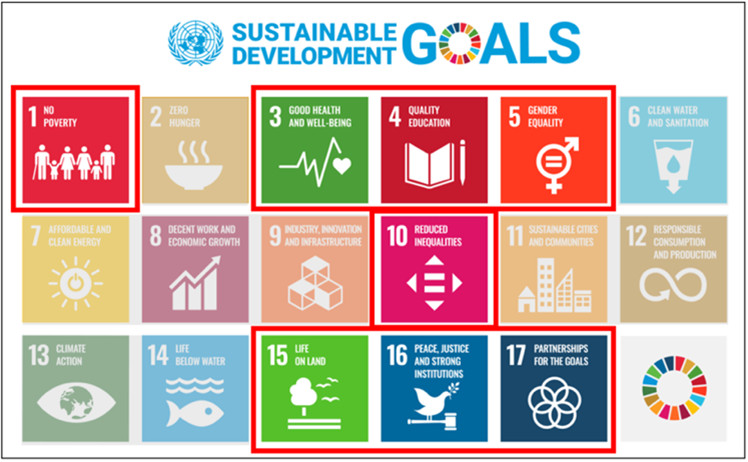Contribution of the project to UN Sustainable Development Goals
The 2030 Agenda for Sustainable Development was adopted by all United Nations Member States in 2015. Its goal is to build a sustainable future through global cooperation. Guided by the core principle of “People, Planet and Prosperity,” the agenda promotes inclusive societies where human well-being, environmental protection, and shared economic prosperity are balanced and mutually reinforcing. The 2030 Agenda is built around the 17 Sustainable Development Goals (SDGs). These goals aim to ensure sustainable development across economic, social, and environmental dimensions, creating new opportunities for both present and future generations.
This project addresses the following SDGs:
- 1: No Poverty - Imparting knowledge about sustainable cultivation and the processing of safe and effective herbal remedies helps to create new sources of income.
- 3: Good Health and Well-being - The project contributes to improved primary medical self-sufficiency with herbal medicine. Not only scientific quality standards play a role here, but also the need of parts of the local population for holistic health care, including the social, psychological, moral and spiritual functions of traditional medicine.
- 4: Quality Education – The museums promote the exchange of and access to relevant knowledge.
- 5: Gender Equality – Ideally, women gain greater financial and health independence, for example through the cultivation of medicinal plant gardens; this also helps to strengthen local communities.
- 10: Reduced Inequalities – The project promotes the (re)recognition and appreciation of Uganda's own traditions and plant-based medicine. In the longer term, their expansion and development can curb dependence on Western medicine in some areas.
- 15: Life on Land – Awareness-raising and education contribute to the sustainable cultivation of medicinal plants and the protection of biodiversity and forests.
- 16: Peace, Justice and strong Institutions – The functioning of sub-areas of traditional medicine, which is geared towards social balance and harmony, promotes peaceful and inclusive societies - a prerequisite for sustainable development.
- 17: Partnerships for the goals – Through international co-operation, resources can be optimally pooled and synergies created to promote sustainable development.
Further information: https://sdgs.un.org/goals
